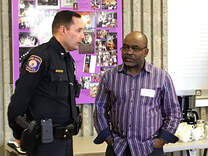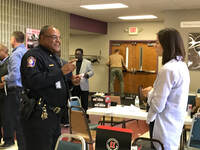 On April 25, the Grand Rapids Association of Pastors met at Grace Christian Reformed Church to hear from the Grand Rapids Police Department's Interim Police Chief David Kiddle and Deputy Chief Eric Payne. Chief Kiddle noted that he'd been with the GRPD for 26 years, with assignments in administrative and investigative "sides of the house." He isn't from Grand Rapids, but grew up in Sparta, New Jersey, which, he noted, "was not the armpit of the U.S., but a lovely spot." He came to the state go to Michigan State University for their criminal justice program. Deputy Chief Payne has been with the department for 32 years, and has held a similar breadth of assignments, including being in charge of the South Service Area for 7 years. He is from Dowagiac. Police Chief Selection Process After the introductions, the first topic Chief Kiddle addressed was the timeline for selecting the new police chief. Applications were closed on April 19 and they started phone interviews soon after that. The city's goal is to have "someone in the chair" on August 1st. He said that he is not a candidate for the position; however, Deputy Chief Payne is a candidate. Payne said, "The important thing is that the best person to be in the community and to lead the police department is chosen." Staffing Study A recent study determined that the GRPD had a sufficient number of sworn police officers to handle current call volumes, but that they could use some reorganizing and some more civilian personnel. Chief Kiddle explained the GRPD perspective on that study. He said that, "we had to decimate the department of civilians when we had the economic downturn to keep the sworn personnel, so they took those [previously civilian-held] jobs." They have not reorganized since that time, so the implication was that the GRPD needs civilian employees so they can transition sworn officers to the operations side. Kiddle said there were several options in the proposed 2020 budget for policing positions, including starting an evening community policing team, hiring a crisis intervention specialist, and creating a new public safety liaison position to increase oversight between the city manager's office and the police department. The budget has now reached the next step, but we haven't learned what, if anything, might have been cut from the public safety portion. We will post any updates about this as they become available on G-RAP's Facebook page. Policing at the Speed of Trust This is a program in which a police officer is paired with a community member, they go through a four-hour training together that teaches communication and trust-building exercises, and then they commit to have six 10-15 minute conversations over the next six weeks. It is designed to both build trust between the community and the police department, and to improve the police officer's communication skills. Kiddle said that, of the 295 officers in the GRPD, 80-90 still needed to go through the program, and they are in need of community members to partner with. He offered to bring the program to any church that is interested. If you have 10-15 people at your church who would be willing to meet one-on-one with a member of the GRPD as part of this program, please send us an email at [email protected] and we will send it along to Chief Kiddle. In response to a question about whether the GRPD has statistics about the effectiveness of the program, Deputy Chief Payne responded: When we announced it, people thought it was the magic bullet that would bring harmony between the police and the community, but it teaches people how to have a conversation. It's about building relationships and developing communication skills and empathy. We have feedback, but no numbers. One of our pastors who participated in Policing at the Speed of Trust and who holds an annual public safety day at his church, when they worship with public safety officers, values the rapport that these efforts have built. But another pastor who went through the program thinks that a different kind of training that more overtly addressed issues of implicit bias would have been more effective. Citizen Police Academy The GRPD offers a 10-week program, four hours, once a week, for civilians to come into the police department and get to know what they do very well. They are also trying out mini academies: one day, 9am - 4pm, lunch included, where they would cover use of force training, traffic stop training, internal affairs, and community engagement, and more. Chief Kiddle offered to do a mini academy just for pastors, if we were interested. Police Oversight There are three different bodies that have differing levels of oversight and review over the GRPD that Kiddle spoke about: the Internal Affairs Department, the Civilian Appeals Board, and the Michigan Civil Rights Review Board. The Internal Affairs Department has a lieutenant and a sergeant assigned to it, and there is an annual report available on the city website. (Go here to download it; the Internal Affairs section is the 9th page.) Kiddle said that anyone can make a report--you do not have to be a victim. There are also a number of ways you can report it: in person (1 Monroe Center NW), online, via a letter. (Go here to access the form and find out more about filing a report.) Chief Kiddle noted that the Civilian Appeals Board (CAB) exists and that "everyone who makes a complaint gets a certified letter about their rights to appeal." He did not want to get into whether the CAB should have subpoena powers or whether it should do more than it currently does. About the Michigan Civil Rights Review Board, Kiddle asserted that, "We open ourselves to outside objective review." He said, "We always assign someone one rank higher than the person being complained about" to investigate it, and acknowledged that they are "going back over some complaints." Recent Use of Force The conversation moved on to a couple of recent use of force incidents (some of which involved juveniles and open investigations, so we will not share details publicly), that resulted in a discussion about the training of GRPD officers. Kiddle defended their training: Our training is excellent. It keeps our officers safe, but it can come across as too aggressive at times. We use scenario-based training for everyone we hire. They get 1,000 different scenarios in 8 weeks. We had 503 use of force incidents out of 13,000 arrests in 2018. That's less than 4%. 17% is the national average.  Pastors continued to ask about the training, to what degree it encouraged de-humanizing of the people officers interact with and to what degree it taught officers to de-escalate situations. Kiddle spoke to the Speed of Trust program: "We see people at their worst. Speed of Trust works because it reminds us that not everyone is a criminal." Payne said that their training is about de-escalation and told a story about someone he met who went through the Civilian Police Academy who had been negative towards the police: "I asked him how it went and he said he shot the baby, that he went through a scenario and panicked." ICE Policy Despite recent GRPD and ICE interactions being in the news, Kiddle did not talk much about this beyond extending an invitation to G-RAP to send representatives to a meeting on May 22 for community stakeholders to provide feedback on the ICE cooperation policy they were developing. Three G-RAP pastors attended the meeting; hopefully we will hear from them soon. The pastors expressed their concerns for the Hispanic community and their congregation members, and what it means for their safety when they fear the police in their own community. Miscellaneous Chief Kiddle wanted to mention that the police department does training for their officers in how to deal with people who are having a mental health crisis. They recently did a training that taught them about people with autism. The GRPD has a Network 180 liaison officer and they will sometimes try to get someone to Network 180 instead of arresting them. The GRPD is hoping to start a campaign to educate the public about what they should do when they are stopped by the police and they would like input from community stakeholders. GRPD and G-RAP As the question and answer period wound down, we discovered that some of G-RAP's previous conversations and meetings with former Chief David Rahinsky and other officers and representatives of the police unions hadn't made it farther than those individual conversations. Pastors' offers to help in certain situations went unheard and both parties could not take advantage of situations that could have built trust. This was disappointing and frustrating, and became a topic of discussion at our May meeting. At that meeting we resolved both to follow up conversations with the GRPD with letters in hopes that a record of the discussion would help build something more lasting and concrete, and to offer our services as on-call chaplains, since the GRPD is without a chaplain. We closed this meeting as we do all meetings with city officials: by praying for them, their work in Grand Rapids, their safety, and for our ability to work together so our community can thrive.
2 Comments
10/19/2020 11:01:46 pm
I am so happy that we are able to resolve things in this manner. I am a person who believes that it is important that we try and do what we can to make things going smoothly. I understand that not everybody can subscribe to this manner of thinking, but still, that does not mean that we should not try to give it a shot? I just want things to be communicated properly. I wish that we can do it.
Reply
Leave a Reply. |
AuthorNatalie Hart Archives
September 2023
|
 RSS Feed
RSS Feed